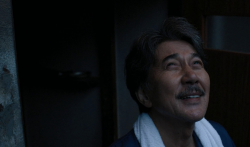Paul Thomas Anderson’s There Will Be Blood is a devilish movie that isn’t easily absorbed in its two-and-a-half-hour runtime. Although it offers hardly any satisfying moments, There Will Be Blood is challenging and engaging, polished filmmaking at its best that makes for a demanding, but extremely rewarding, experience.
The film’s opening scene shows Daniel Plainview (Daniel Day-Lewis) as a poor, lonesome silver miner in 1898. Jumping to 1911, Plainview has become an independent oil magnate who never leaves his adopted son’s side. A tip from a runaway leads the pair to the small, dry town of Little Boston, where they find a river of oil bubbling under the town’s surface. Motivated by greed for the oil, Plainview and his rival—the evangelical preacher Eli Sunday (Paul Dano)—square off in an epic struggle for power.
Inspired by Upton Sinclair’s 1926 novel Oil!, the film shares only a bit of dialogue, themes and part of the setting with the novel. Everything else, including the plot, is original. Anderson captures the origins of Southern California’s oil industry within his panoramic shots of the barren landscape, but is at his best when addressing Sinclair’s themes of greed and hardship through insights into Plainview’s character. For examples, when Plainview’s team first strikes oil—one of the most pivotal scenes of the movie—the liquid shoots out of the earth and exploding into a fireball, striking Plainview’s son and engulfing the rig in a blaze of fury. Amidst the chaos, an oil-coated Plainview, who has abandoned his injured son and “gone crazy in happiness,” tells his beleaguered assistant, “There’s a whole ocean of oil under our feet and no one can get at it except for me.”
There Will Be Blood is a departure from Anderson’s earlier films such as Boogie Nights and Punch-Drunk Love, but is still brilliant filmmaking. The soundtrack—composed by Radiohead’s Jonny Greenwood—can be overbearing, but is crucial to the film’s eerie ambiance. Dano and Day-Lewis are perfectly cast, and the Oscar buzz around Day-Lewis’ performance is more than justified. While his character spiraled into isolated depression, I couldn’t help but root for him even as he committed increasingly horrible acts. Plainview explains, “There are times when I look at people and I see nothing worth liking … I’ve built up my hatreds over the years little by little … I see the worst in people.” Anderson imbues his movie with as much ambiguity and complexity as Day-Lewis gives Plainview, with spectacular results.




